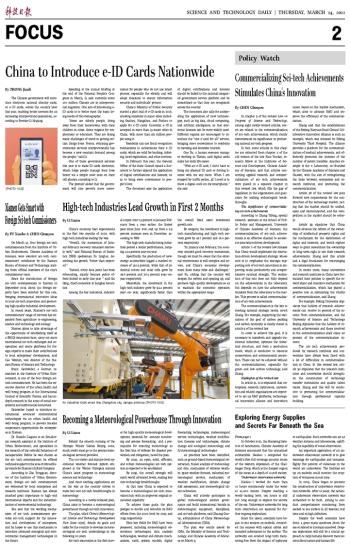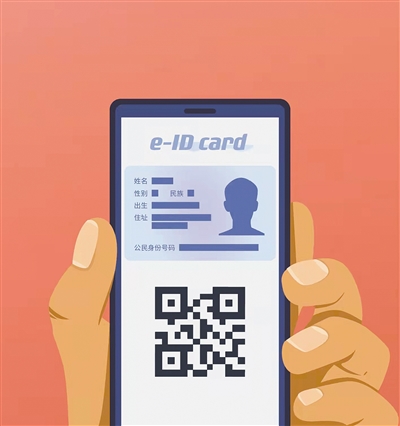
 Commercializing Sci-tech Achievements Stimulates China's Innovation
Commercializing Sci-tech Achievements Stimulates China's Innovation China to Introduce e-ID Cards Nationwide
China to Introduce e-ID Cards Nationwide Xiamen Gets Smart with Foreign Sci-tech Commissioners
Xiamen Gets Smart with Foreign Sci-tech Commissioners High-tech Industries Lead Growth in First 2 Months
High-tech Industries Lead Growth in First 2 Months Becoming a Meteorological Powerhouse Through Innovation
Becoming a Meteorological Powerhouse Through Innovation Exploring Energy Supplies and Secrets Far Beneath the Sea
Exploring Energy Supplies and Secrets Far Beneath the Sea
 |
| (PHOTO: VCG) |
The Chinese government will introduce electronic national identity cards, or e-ID cards, across the country later this year, enabling better services for an increasing interprovincial population, according to Premier Li Keqiang.
Speaking at the annual briefing at the end of the National People's Congress in March, Li said currently some 100 million Chinese are in interprovincial migration. One aim of introducing e-ID cards is to better meet the basic living needs of this demographic.
"Some are elderly people, living away from their hometowns, with their children in cities. Some migrate for employment or education. They are facing many challenges of travel in getting certain things done. Hence, obtaining governmental services interprovincially has become a new constant demand among the people," said Li.
One of these government services this year is to make ID cards electronic, which helps people manage their lives better via a simple code-scan on their cell phones, according to Li.
The premier added that the government will also provide more convenience for people who do not use smart phones, especially the elderly, and will adopt measures to ensure information security and individuals' privacy.
China's Ministry of Public Security started a pilot trial of e-ID cards in 2018, allowing residents in major cities including Quzhou, Hangzhou, and Fuzhou to apply for e-ID cards. Currently, e-ID is accepted in more than 15 major cities in China, with more than six million people using it.
Residents can use facial recognition mechanisms to authenticate their e-ID cards, which are valid for banking, ticketing, hotel registration, and other services.
In February this year, the General Office of the State Council issued a document to further expand the application of digital certifications and licenses, so as to bring more convenience to people's lives.
The document says the application of digital certifications and licenses should be linked to the national integrated government service platform and be streamlined so that they are recognized across the country.
The document also calls for accelerating the application of new technologies, such as big data, cloud computing, and artificial intelligence, so that electronic licenses can be more widely used. Different regions are encouraged to introduce the "one e-card for all" service, bringing more convenience to residents in traveling and domestic tourism.
Guo Xu, a human resource manager working in Tianjin, said digital cards make her daily life easier.
"With an e-ID card, I don't have to bring my physical ID card or driving license with me any more. When I am stopped by traffic police, all I need is to show a digital code on my smartphone," she said.


 Next
Next



